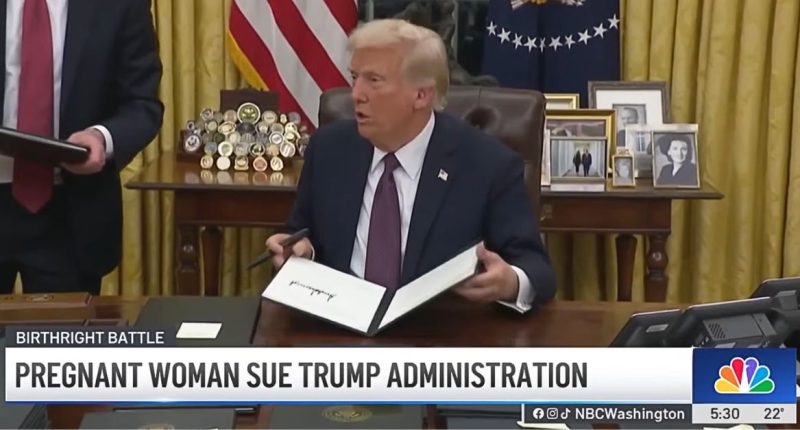
Donald Trump signing an executive order aimed at ending birthright citizenship in the U.S. (Forbes).
A coalition of four states asked the federal judge who recently placed a 14-day temporary restraining order halting Donald Trump’s controversial executive order ending birthright citizenship to go a step further and prevent the law from taking effect until a final judgment on the matter is rendered.
The 32-page motion was filed Monday in the U.S. District Court in Seattle on behalf of the states of Arizona, Illinois, Oregon, and Washington. The case is before U.S. District Judge John Coughenour, a Ronald Reagan appointee who last week put the temporary pause on Trump’s order following an emergency hearing in which he referred to the measure as being “blatantly unconstitutional.”
“I have difficulty understanding how a member of the bar could state unequivocally that is a constitutional order,” the judge said. “It boggles my mind.”
The states filed the suit in response to Trump’s order, signed only hours after he took office for the second time, which directs the secretary of state, attorney general, secretary of homeland security, and social security commissioner to cease recognizing citizenship for children whose parents are in the U.S. illegally or in the country on a legal but temporary basis after 30 days from the date the order was signed.
In urging the court to issue the preliminary injunction, the states compared Trump’s order to the U.S. Supreme Court’s notorious 1857 decision in Dred Scott v. Sanford, in which the justices held that enslaved Black people and their descendants were not citizens and thus were not conferred with the rights and privileges afforded to others under the U.S. Constitution.
In response to the ruling, Congress in 1868 ratified the 14th Amendment, which, among other things, granted citizenship to people born or naturalized in the U.S., with limited exceptions.
“The Citizenship Clause repudiated Dred Scott and reaffirmed the common law principle of jus soli, under which all individuals born in the United States and subject to its jurisdiction are citizens,” the states wrote in the filing. “Its operation is automatic and its scope broad. It provides our Nation a bright-line and nearly universal rule under which citizenship cannot be conditioned on one’s race, ethnicity, alienage, or the immigration status of one’s parents.”
The states categorize Trump’s birthright citizenship measure as a massive overreach of the executive branch’s power that would reverse more than a century of how the government identifies and defines its citizens.
“President Trump and the federal government now seek to impose a modern version of Dred Scott. But nothing in the Constitution grants the President, federal agencies, or anyone else authority to impose conditions on the grant of citizenship to individuals born in the United States,” the filing says. “It is flatly contrary to the Fourteenth Amendment’s text and history, century-old Supreme Court precedent, longstanding Executive Branch interpretation, and the Immigration and Nationality Act (INA). The Plaintiff States are therefore exceedingly likely to succeed on the merits of their claims.”
In addition to arguing that the order is unconstitutional, the states also asserted that they would be irreparably harmed if the measure went info effect as thousands of children would be left “stateless” and the plaintiff states would lose access to “substantial federal funds” that are conditioned on the citizenship of their residents.
“In issuing the Temporary Restraining Order currently in place, the Court rightfully recognized the blatant unlawfulness of the Citizenship Stripping Order and the grave harms it will cause,” the states wrote. “A preliminary injunction is imperative to protect the Plaintiff States and their public agencies, public programs, public fiscs, and state residents against the egregiously illegal actions of the President and federal government.”








